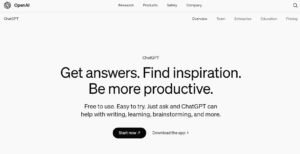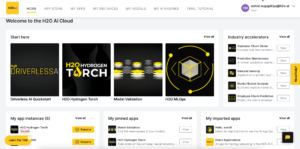20 Top AI Tools for University Students
This article explores the 20 of the best AI tools, highlighting their key features, use cases, pricing, pros, and cons, to help students choose the right tools for their university journey.
1. ChatGPT (OpenAI)
Key Features:
- AI-powered chatbot for answering questions and generating text.
- Excellent for brainstorming, drafting essays, and explaining complex concepts.
Use Cases:
- Research assistance, essay writing, and summarising texts.
- Clarifying difficult topics and providing explanations.
Start Price:
- Free basic version.
- ChatGPT Plus at $20 per month (GPT-4 access).
Pros:
- Versatile across various subjects.
- User-friendly with free access.
Cons:
- Limited knowledge beyond 2021 in the free version.
- May need fact-checking.
2. Grammarly
Key Features:
- AI-powered grammar, spelling, and style checker.
- Plagiarism detection and tone suggestions.
Use Cases:
- Improving essays, reports, and assignments.
- Ensuring correct grammar and avoiding plagiarism.
Start Price:
- Free version available.
- Premium starts at $12/month (billed annually).
Pros:
- Excellent grammar and style suggestions.
- Plagiarism checker included.
Cons:
- Premium needed for advanced features.
- Over-corrects at times.
3. Notion AI
Key Features:
- AI writing assistant embedded in the Notion workspace.
- Note-taking, task management, and content generation.
Use Cases:
- Summarising research, managing projects, and collaborating on group assignments.
- Writing and organising study materials.
Start Price:
- Free plan available.
- AI features from $10 per month.
Pros:
- Versatile note-taking and task management tool.
- Ideal for collaboration.
Cons:
- AI functionality requires paid plan.
- Interface may feel complex for new users.
4. QuillBot
Key Features:
- AI paraphrasing tool with summarisation and grammar checking.
- Multiple writing modes (Standard, Fluency, Creative).
Use Cases:
- Rewriting and paraphrasing academic content.
- Summarising long papers or improving writing clarity.
Start Price:
- Free plan available.
- Premium starts at $8.33 per month.
Pros:
- Effective for avoiding plagiarism.
- Summarisation tool is useful.
Cons:
- Premium needed for advanced modes.
- Limited functionality in the free version.
5. Jasper AI
Key Features:
- AI writing tool for essays, articles, and creative content.
- Built-in templates for content creation.
Use Cases:
- Writing essays, reports, or creative writing tasks.
- Generating ideas and drafting content quickly.
Start Price:
- Plans start at $39 per month.
Pros:
- High-quality content generation.
- Great for overcoming writer’s block.
Cons:
- Pricey for students.
- May generate generic content.
6. Mendeley
ebsite:Key Features:
- Reference management tool for organising research papers.
- Generates citations and bibliographies.
Use Cases:
- Managing academic references and citations for essays and research papers.
- Organising research papers and PDFs.
Start Price:
- Free version with 2GB storage.
- Premium plans start at $4.99 per month.
Pros:
- Simplifies referencing.
- Free plan with key features.
Cons:
- Limited storage in free plan.
- Syncing issues sometimes reported.
7. Wolfram Alpha
Key Features:
- AI-powered computational engine for solving problems.
- Provides detailed step-by-step explanations.
Use Cases:
- Solving complex mathematical, scientific, and statistical problems.
- Data visualisation and generating solutions.
Start Price:
- Free basic version.
- Pro starts at $5.49 per month.
Pros:
- Highly accurate for technical subjects.
- Provides detailed, understandable solutions.
Cons:
- Limited to factual queries.
- Pro features behind a paywall.
The 20 top AI tools for university students
8. Socratic (Google)
Key Features:
- AI-powered homework helper using image recognition.
- Step-by-step explanations for various subjects.
Use Cases:
- Solving maths, science, and history homework problems.
- Quick solutions for academic queries.
Start Price:
- Free.
Pros:
- Completely free.
- Simple, intuitive interface for quick answers.
Cons:
- Limited depth for university-level problems.
- Mostly suited for basic subjects.
9. Otter.ai
Key Features:
- AI-driven transcription tool.
- Converts speech to text in real-time.
Use Cases:
- Transcribing lectures, discussions, or meetings.
- Creating notes from recorded audio.
Start Price:
- Free version available (300 mins/month).
- Premium starts at $8.33 per month.
Pros:
- Accurate real-time transcription.
- Speaker identification feature.
Cons:
- Limited transcription time in the free version.
- Struggles with noisy environments.
10. Khan Academy
Key Features:
- Free educational platform with personalised learning paths.
- AI-driven learning tools for maths, science, and more.
Use Cases:
- Extra practice for maths and science courses.
- Revision for university exams and coursework.
Start Price:
- Free.
- Premium starts at $12 per month.
Pros:
- Comprehensive learning resource.
- Completely free and accessible.
Cons:
- Not always aligned with university curricula.
- Limited advanced content for some subjects.
11. Caktus AI
Key Features:
- AI-powered tool for writing, coding, and research assistance.
- Includes CV building features for career preparation.
Use Cases:
- Essay writing, research paper generation, and coding assistance.
- Career-focused tools like CV writing.
Start Price:
- Plans start at $24.99 per month.
Pros:
- Multiple use cases, from writing to career prep.
- Helpful for tech and coding assignments.
Cons:
- Limited features in free version.
- Not suitable for advanced coding projects.
12. Perplexity AI
Key Features:
- AI research assistant for answering academic questions.
- Provides summarised answers and citations.
Use Cases:
- Quick research for essays or assignments.
- Summarising academic papers with citation support.
Start Price:
- Free.
- lans start at $20 per month.
Pros:
- Offers citations with summarised information.
- Quick responses.
Cons:
- Limited depth in some answers.
- Still in development, so features can be basic.
13. DeepL Translator
Key Features:
- AI-powered translation tool with high accuracy.
- Supports multiple languages and academic jargon.
Use Cases:
- Translating academic papers and research materials.
- Useful for students in language studies.
Start Price:
- Free version available.
- Pro starts at €7.49 per month.
Pros:
- Highly accurate translations.
- User-friendly interface.
Cons:
- Free version has limited advanced features.
- May struggle with highly specialised academic language.
14. Hemingway Editor
Key Features:
- AI tool for improving writing clarity and simplicity.
- Highlights complex sentences and grammar issues.
Use Cases:
- Editing essays, reports, and presentations.
- Improving writing for clarity and conciseness.
Start Price:
- Web version is free.
- Desktop app costs $19.99 (one-time fee).
Pros:
- Affordable, with a free web version.
- Improves readability and writing style.
Cons:
- Not as advanced for grammar checks as Grammarly.
- May oversimplify complex academic writing.
15. Elicit
Key Features:
- AI research assistant for academic literature review.
- Helps with hypothesis generation and summarises academic papers.
Use Cases:
- Conducting literature reviews and finding research papers.
- Summarising academic articles for essays.
Start Price:
- Free.
- Plans start at $10 per month.
Pros:
- Tailored for academic research.
- Summarises key insights from papers.
Cons:
- Limited to academic use.
- Still in early development stages.
16. Scholarcy
Key Features:
- AI tool for summarising research papers.
- Extracts key points, figures, and citations.
Use Cases:
- Summarising long academic papers and generating summaries.
- Organising research for essays or dissertations.
Start Price:
- Free trial available.
- Premium starts at $7.99 per month.
Pros:
- Efficient for summarising academic papers.
- Saves time during research.
Cons:
- Premium needed for advanced features.
- Can miss nuance in some texts.
17. Lumen5
Key Features:
- AI-powered tool to turn text into engaging videos.
- Offers customisable video templates.
Use Cases:
- Creating visual content from lecture notes.
- Making presentations or explainer videos for assignments.
Start Price:
- Free version available.
- Paid plans start at $19 per month.
Pros:
- Easy-to-use video creation tool.
- Ideal for visual learners.
Cons:
- Limited features in the free plan.
- Premium features can be expensive for students.
- Turnitin
Key Features:
- Industry-leading AI plagiarism detection tool.
- Used by universities to ensure academic integrity.
Use Cases:
- Checking assignments and essays for plagiarism.
- Detecting unintentional plagiarism before submission.
Start Price:
- Available through institutional subscriptions.
Pros:
- Highly accurate plagiarism detection.
- Trusted by universities worldwide.
Cons:
- Only accessible through institutions.
- Turnaround time can vary.
- My Study Life
Key Features:
- AI-powered planner for managing schedules and tasks.
- Syncs across devices to organise assignments and exams.
Use Cases:
- Tracking deadlines, assignments, and exam dates.
- Organising time efficiently across different courses.
Start Price:
- Free.
- Plans start at $10 per month.
Pros:
- Free version and easy to use.
- Cloud sync for seamless access.
Cons:
- Lacks advanced task prioritisation features.
- Simple interface may not be detailed enough for some users.
20. WriteSonic
Key Features:
- AI writing assistant for creating essays, blogs, and reports.
- Supports multiple content formats and writing styles.
Use Cases:
- Writing essays, summarising research, and generating creative content.
- Useful for blog writing and social media posts.
Start Price:
- Free trial available.
- Paid plans start at $12 per month.
Pros:
- Versatile for different writing tasks.
- Easy-to-use interface.
Cons:
- Requires manual editing for best results.
- Free version has limited features.
Conclusion
These AI-enabled tools offer university students a wide range of functionalities, from simplifying research and writing essays to improving time management and creating engaging presentations.
While many of these tools provide free versions, some of the premium options may be worth the investment for serious students looking to enhance their academic experience.




















